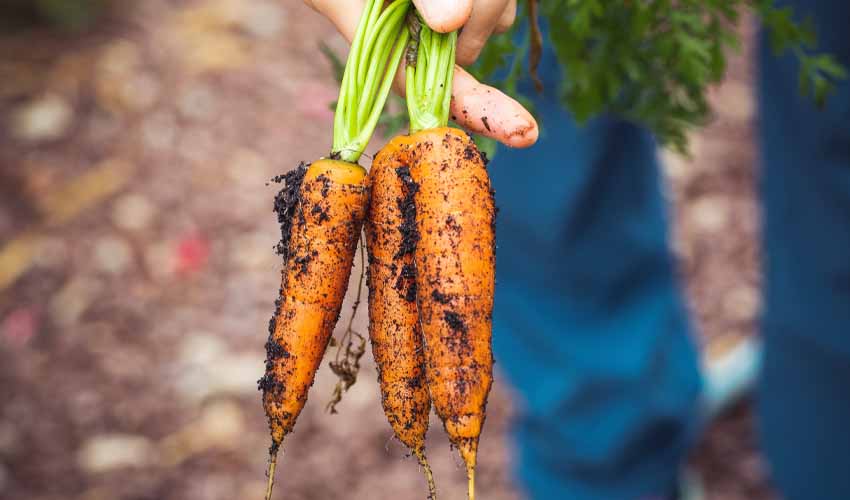Food literacy research project unearths positive outcomes
Garden to Plate is for everyone

Shared learning of Garden to Plate between preschool-aged children and their parents/caregivers is unique and important.
A Mount Royal University community-based research project continues to successfully support local families in growing and preparing healthy food.
Since 2019, Garden to Plate has been teaching young children and their families how to plant a small family garden, how to care for and tend to the plants and soil, and then how to prepare those vegetables in the kitchen. Garden to Plate works with CUPS, Calgary Co-op, Sobeys and Safeway, and the learning happens in a supported, family-oriented environment that connects food growing, purchasing, preparation and nutrition knowledge together.
Dr. Lynne Lafave, PhD, associate professor in the Department of Health and Physical Education and project lead, says that food deskilling, which includes losing practices, relationships and agency around food, is a problem in our society today related to lower food literacy.
“People are busy, and to save time they may buy more ready-made processed food. Without realizing it, they may be choosing prepared foods that are higher in fat, sugar and salt. A recipe that is not good for our health.”
In 90-minute food literacy classes, which are held over twelve weeks, families connect together, build relationships and discover new ways to make better food choices.
“We do 45 minutes in the garden and then 45 minutes with a nutrition program where the kids are preparing food. They are learning age-appropriate food preparation skills and then sharing the food as a community of learners,” Lafave says.
Dr. Sonya Jakubec, PhD, professor in the School of Nursing and Midwifery, explains that the shared learning of Garden to Plate between preschool-aged children and their parents/caregivers is unique and important.
“Certainly, anchoring food literacy early in life and directly into caregiving relationships and linking food growing and preparation are strong experiences and life-changing.
“We heard loud and clear in the research that seeing children anew was game-changing for family relationships and that children were not a nuisance to be sent away, but rather to be engaged in food growing and preparation. Literacy about food changed the family dynamics, empowering and inspiring the family.”
Meet Ingrid
A recent Garden to Plate collaboration in partnership with CUPS this year involved a mother and her three children.
A CUPS client named Ingrid experienced a negative turn in life and she found herself and her children at the Calgary Women’s Shelter.
She describes the ordeal as traumatic, and as a turning point.
Ingrid’s story was told on cupscalgary.com: “Within the safety of the shelter, (Ingrid) promised herself it was time for change and realized if she wanted to provide a future for herself and her kids, it was up to her. For Ingrid, this meant going back to school and starting a good career that would provide for her family. At the shelter, Ingrid was connected with a counsellor who referred her to CUPS for additional support to help achieve her career goals.”
In time, Ingrid’s life changed for the better and she remained connected to CUPS as she was keen to continue to make positive changes in her life. CUPS connected Ingrid to Garden to Plate and it was a great fit for her family.
“The program taught my family the importance of planting fruits and vegetables, how to prepare them and the role they play in the diet,” Ingrid reflects.
“There was a lot of great information, but best of all, we had a lot of fun together.”
Jakubec says that the Garden to Plate research process is special because of on-the-ground partnerships.
“When academics work so closely with community partners like CUPS and alongside other supportive agencies, the research results have a home, a context and real momentum. Garden to Plate has unearthed (pun intended) knowledge that can be easily adapted to other programs and activities that are meaningful, relevant and timely."
Lafave says the research team is working on a knowledge translation package to share the program with the broader community so as many people as possible may benefit from the research.
Sept. 1, 2021 — Rob Petrollini
Media request contact information.
Have a story idea? Please fill out this form.

